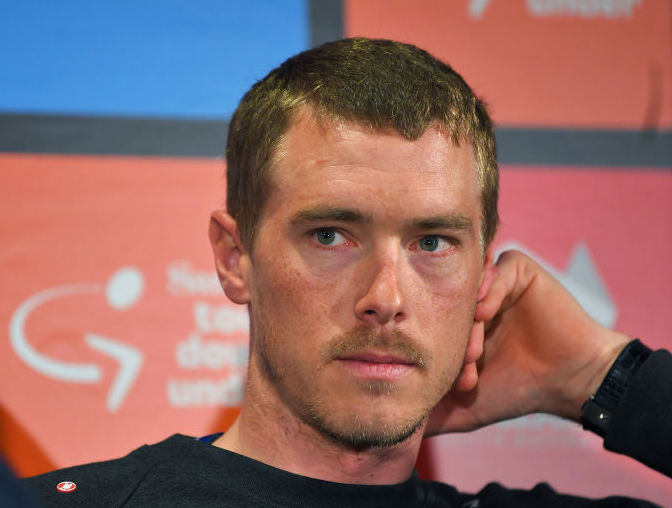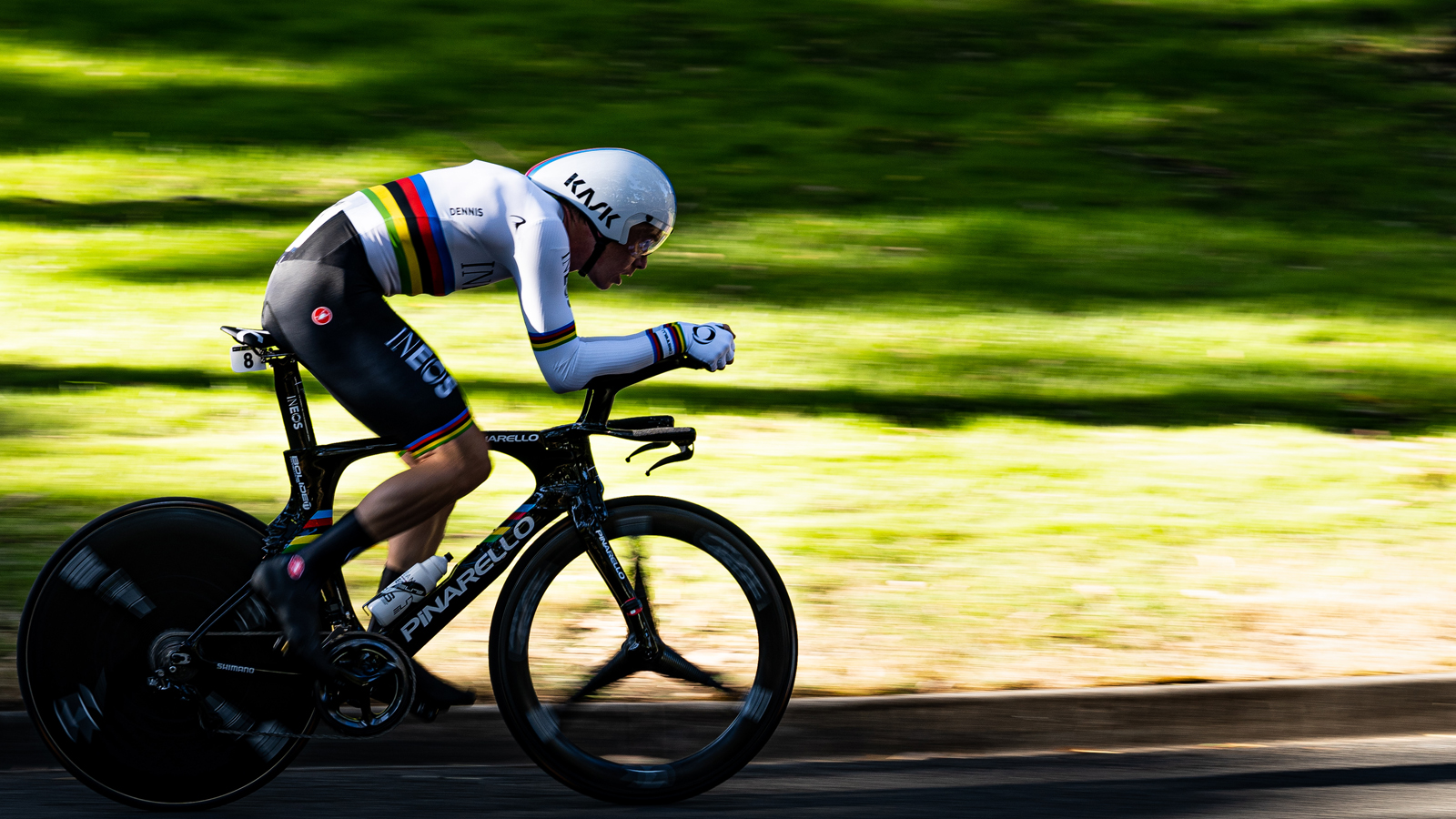Rohan Dennis: Exiting the Tour de France was for the benefit of my family
Australian speaks openly and emotionally about his divorce from Bahrain-Merida

Rohan Dennis has spoken openly and emotionally about his bitter divorce from the Bahrain-Merida team, revealing he suddenly quit the Tour de France to save his marriage and his sanity after a gradual decline in his mental wellbeing.
Dennis abruptly climbed off during stage 12, on the eve of the time trial he was expected to win in Pau, leaving Bahrain-Merida unsure how to react and seemingly unable to respond to their rider's needs.
He never rode for the team again and spent the 10 weeks after the Tour de France preparing for the defence of his time trial world title. During that period he stepped away from social media and sought help from his friend and psychologist Dr. David Spindler and coach Neal Henderson. He came back to competition at the world championships and duly won his second individual rainbow jersey, riding on an unbadged BMC bike and in Australian national colours.
Dennis describes the world championships as "the biggest job interview of my life", but the victory helped get his racing career back on track. He joined Team Ineos in December and makes his racing debut at the Tour Down Under on Tuesday.
"The people around me are noticing that I'm in a much better place mentally and that's the main thing. It's been a really positive move [to Team Ineos] and I'm really keen to keep it going that way as well," Dennis explained to media, including Cyclingnews, in Adelaide on Monday.
"It's a good place to be out of," he added, emotionally opening up about his recent months on a mental roller coaster.
"I think it's pretty obvious where it came from. There was a lot of stuff that happened after the Tour de France, during the Tour de France from my exit, and there was a lot of stuff that happened before Worlds that is still being sorted via arbitration with Bahrain-Merida.
Get The Leadout Newsletter
The latest race content, interviews, features, reviews and expert buying guides, direct to your inbox!
"I didn’t realise how bad I was. I heard some stuff from my [psychologist] that he had plans to take further action for my mental health benefit. I didn't know about that until two or three weeks ago. When you're in it, you're obviously not happy but you don't realise how bad you actually are."
Dennis is careful not to go into details of his divorce from Bahrain-Merida or why he is convinced he can win the legal arbitration. The team, now managed by Rod Ellingworth, is making their defence but preferred not to respond when contacted by Cyclingnews.
Dennis is keen to move on but is not ready to forgive and forget.
"Until that door is closed and the arbitration finished, it won't be completely out of my mind, but I'm not bitter. It's a learning curve and something that has benefited me, not just in my cycling career but also for the rest of my life, too," he says firmly.
Dennis suggests Bahrain-Merida tried to somehow force him out of the team with a series of malicious actions, spread over time.
"You didn't realise how bad it had become because it was a gradual process, with different events putting you into a bad place," he reveals.
"There were actions that were somewhat calculated to hit at certain times of day, to affect sleep or training and times of the week, so nothing could be done over the weekend. That was a favourite move.
"They were very clear incentives to get me to move on. And I'm not the person to lie down and let someone generally take advantage of me in any shape or form. It was a recipe for disaster."
The disaster unfolded at the Tour de France when the Bahrain-Merida team were in meltdown, and even team leader Vincenzo Nibali was rumoured to be close to climbing off and heading home. Nibali is happy to have moved on to Trek-Segafredo for 2020.
Dennis explains exactly why he suddenly decided to leave the Tour de France.
"It was for personal family reasons between the person I was becoming due to the situation I was put under. The environment that I was in was causing me to be, let's just say, not a good or a happy person to be around," he says.
"It was snowballing, it was getting worse and, in the end, I didn't want to be a statistic of a sportsperson who was potentially going to be divorced."
It was a huge moment in Dennis' life and a turning point in his career. It would wreck his relationship with Bahrain-Merida and drastically cut his value as a rider. Yet Dennis has no regrets about climbing off on the road to the Pyrenees that day in July.
"No, not at all. I think I would have been kicking myself if I hadn't," he explains.
"I didn't do it for personal reasons. I honestly believe that if I'd continued and finished the stage, it would have been even worse because it would have looked even more planned, that I was going to exit just to annoy the team. Whereas me exiting the Tour de France was for the benefit of my family.
"There was no plan for how to best ruin the team's reputation, to destroy sponsors and whatnot, because not once did I go to the media and bad-mouth any of the partners, the team and the sponsors. I kept very quiet, which was agreed with the team. It's not anyone's business what is going on in my personal life; the team and I decided we'd sort it out behind closed doors, as a professional group always should. But then it snowballed from there and moves were made that I don't think were the best for everybody."

In a better place during the honeymoon phase with Team Ineos
Dennis is clearly in a better place after a few months at Team Ineos. He is arguably still in the honeymoon phase with the British team but at least feels supported. He says he has especially bonded well with Luke Rowe, who has a similar temperament.
"I think a lot of teams are stuck in that old-school mentality where we [the riders] are assets but also 'pawns in a chess game'," Dennis suggests.
"There are some teams, and I'm talking about Ineos, where they really do care about your mental state. They've got a psych there when needed and when you're struggling. Some teams know that we're not just robots, that we are humans. There's the old saying that 'happy riders ride well'. If you're happy in the environment, then you're always going to push a little harder for yourself, your teammates and the management. That's why I believe Ineos are a successful team: they're a united team from start to finish.
"At the training camp, I noticed that everyone was happy to be there. It was very much: 'Okay, I've got a job to do, I'll do it and I'll happily do it.' No one was complaining, saying they were tired; everyone was striving to do their job better. That really comes from the top down. I think with Dave Brailsford and [Team Ineos CEO] Fran Millar they really have nailed the whole culture by being very positive and hard-working. It's why the team is so successful, for sure."
The road to Tokyo and Olympic gold
Dennis will make his debut with Team Ineos at the Tour Down Under in his hometown of Adelaide. He is on form, but suggests Team Ineos also have Dylan van Baarle and Pavel Sivakov. However, Dennis won the 2015 Tour Down Under and took the vital stage to Paracombe in 2015.
His 2020 season will be built around the time trial at the Olympic Games, with other races offering opportunities for success on the road to Tokyo. In 2016, he was a favourite for a medal in Rio but a broken aero bar forced him to change bikes and he finished fifth.
Dennis reaffirmed that he is no longer interested in testing his Grand Tour credentials in the hope of one day winning one of them. The rewards no longer seem worth the massive sacrifices that are required.
"I just don't think that's what I really want to try and do any more," Dennis admits.
"Time triallists are quite special in themselves, but GC riders for Grand Tour require a completely different mindset – not just on the bike but also off the bike, sacrificing 99.9 per cent of having a life off the bike. I just ended up not finding that enjoyable at all.
"I enjoy targeting one-week races; I'm good at that. I believe I'm 'OK' at time trialling and I enjoy that as well. So why go down a road I wasn't enjoying as much?"
Dennis will ride the Giro d'Italia and help 2019 winner and fellow new Team Ineos signing Richard Carapaz, and he will no doubt target the three time trials in the Corsa Rosa. He revealed he has the Volta ao Algarve, Tirreno-Adriatico and the Tour of the Alps on his provisional race schedule, with a training camp and the Tour de Pologne in July his likely path to peak fitness for the Olympic Games.
The Belgian media in the meeting room in the Adelaide Hilton were delighted to hear Dennis name Remco Evenepoel (Deceuninck-QuickStep) as his biggest rival for the time trial at the Tokyo Olympics.
"Remco is a threat," Dennis says, giving the Belgian the headline they were looking for.
"I honestly think Victor Campenaerts [NTT] is very good and Wout van Aert [Jumbo-Visma] was unlucky to crash at the Tour de France. It's not good to see anyone come off and be out of action for so long for something like that. But Tokyo is going to be especially hard with Remco there. It's a course that doesn't suit the bigger guys or the all-round time triallist. But with his power, and he's not very big, I think he's going to be the one who is going to push everyone the most. I think he's an automatic medal contender."
There are also the likes of Tom Dumoulin, Primoz Roglic, Geraint Thomas, Chris Froome and Julian Alaphilippe, who will ride the Tour de France before dashing to Tokyo in the hope of holding onto their form and mental focus one week after reaching Paris. That is a risk Dennis does not want to take.
"It all depends on how Dumoulin comes out of the Tour," Dennis argues. "Sometimes you can come out of the Tour like 'Wiggo' [Bradley Wiggins] did in 2012 to win in London. I would never say Tom is not going to win in Tokyo. He's a class rider, he's rock solid. Every time he puts his head to something, he's good at that race. I believe he will be right up there – at worst top five.
Dennis will also be hoping to be mentally and physically rock solid when he arrives in Tokyo, with the training done and his relationship with Team Ineos still steady. Then no outside tensions can affect him. It will be him against the clock.
"The best thing about time trialling, is that you can only worry about yourself," Dennis says, revealing when he perhaps is in his personal and physiological essence.
"You've got to figure out how to get your rear end around that course as fast as possible, and you just hope that it's better than everyone else."

Stephen is one of the most experienced member of the Cyclingnews team, having reported on professional cycling since 1994. He has been Head of News at Cyclingnews since 2022, before which he held the position of European editor since 2012 and previously worked for Reuters, Shift Active Media, and CyclingWeekly, among other publications.